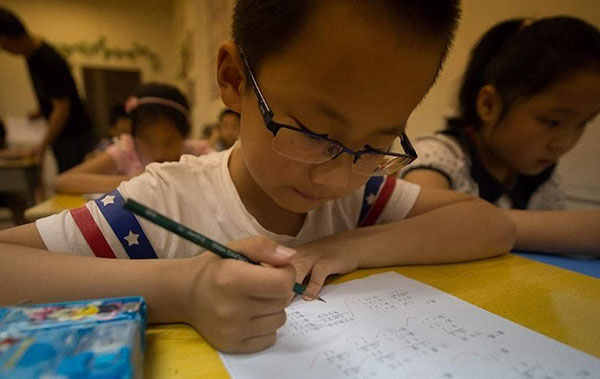
A student from a primary school in Nanjing, Jiangsu province, practices for the aoshu, or math Olympiad, during a class in July 2014.(Photo/Xinhua)
After winning 14 times in 20 years, second-place finish to the United States stings contest's fans
China's defeat at this year's International Mathematical Olympiad in Thailand has prompted an outpouring of negative comments and second-guessing by the country's netizens.
Overzealous fans are being urged to view the annual mathematical Olympiad as well as this year's results in a more rational manner. "It's common to win some contests and lose others. There's no need to make a fuss," said Zhu Xu, a math professor at Xi'an Jiaotong University.
Zhu made the remarks after the Chinese team lost last week's final to the United States by four points. The U.S. had not won since 1994.
"In fact, China has been champion of the Olympiad many times, and other countries are making efforts to catch up," Zhu said. "It's normal to have victories and defeats under the increasingly fiercer competition."
Li Qiusheng, coach of the Chinese team, said the talent disparity between the strong countries is getting smaller.
Driven by bonus points?
China first took part in the Olympiad, a top math contest for high school students, in 1985, and has taken the crown 14 times over the past 20 years.
Some netizens attributed this year's defeat to China's cancellation of bonus points for Olympiad winners during the gaokao, the national college entrance exam, a reform policy implemented by the Ministry of Education last year.
Chinese children often get math Olympiad training as early as elementary school, and have national championships at that level.
Previously, a winner of a domestic or international math Olympiad could get about 20 bonus points on the gaokao, the total score of which was 750 points in most of China. Large numbers of students worked hard and competed for medals in hopes of obtaining the bonus, a higher gaokao score, and a place at a good university.
Netizens complained that the change meant Chinese students lost motivation to work hard on the Olympiad.
Lin Yong, a professor of applied math at the School of Information at Renmin University of China in Beijing, didn't agree. While many students did the math Olympiad for extra points, those selected to take part in the International Olympiad are the best among their peers and represent China with passion, he said.
"These students were not affected by the change in the bonus-point policy," he said.
He also said China should take pride in its second-place finish. "It doesn't matter whether it's first or second place. Both are good," he said.
Li, the Chinese coach, said China and the U.S. are "very much ahead" of the rest of the competitors. "Although four points behind the U.S., China was 20 points ahead of third-place South Korea," Li said.
Changing situation
Xiong Bingqi, vice-president of the 21st Century Education Research, said Chinese people place too much importance on the Olympiad's results.
"In the past, so many Chinese students spent so much time preparing for the Olympiad in order to stand out, but few became masters in math because they were led by results, not interest," he said.
The situation may be changing. Zhu, from Xi'an Jiaotong University, said the math Olympiad was resuming its original status after the bonus gaokao points were canceled and the nationwide contest fever was cooling.
"Essentially, the Olympiad is something beyond regular classroom math and is suitable to only a small group of interested and talented people. It shouldn't be boosted on a large scale," he said.
Renmin University's Lin added: "It's good news that the math Olympiad is resuming its minority position, which means it will keep out the uninterested ones and leave those that are really passionate about it."
Zhu said: "Let the students pursue the 'intelligence game' following their own interest and talent and the outcome may be better."


















































